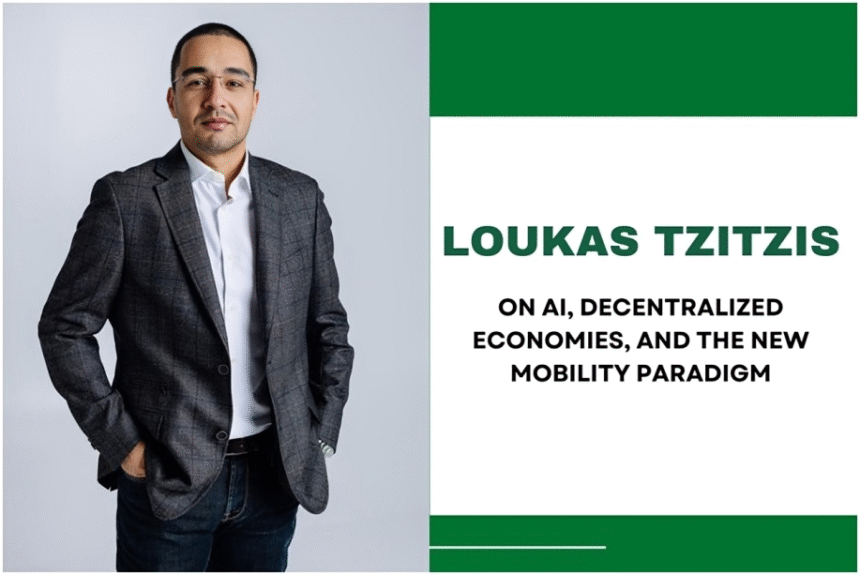In today’s hyper-connected, constantly disrupted digital economy, staying ahead is no longer about keeping up with trends—it’s about helping shape them. Few executives understand this better than Loukas Tzitzis, a seasoned strategist and technologist whose insights into AI, mobility, and decentralized systems are becoming essential reading for anyone looking to understand the future of digital platforms.
Artificial Intelligence and the Next Era of Urban Transport
Loukas Tzitzis is unequivocal when discussing artificial intelligence: “AI is not just a tool—it’s a paradigm shift.” While many executives still talk about AI in speculative or hypothetical terms, he speaks with urgency and clarity about its current impact and rapidly accelerating future.
From real-time traffic prediction to autonomous fleets and AI-powered customer interfaces, Tzitzis emphasizes that the transformation is already well underway. “It’s not a matter of when. It’s now,” he asserts. “Over two dozen companies globally are running advanced, commercially viable self-driving operations. Cities like Wuhan already have autonomous ride-hailing systems with real-time traffic and safety optimizations.”
Yet he’s pragmatic about the current situation and is not blind to the disruptive consequences. “Let’s be honest,” he adds, “the rise of AI will eliminate jobs and there could be significant cybersecurity ramifications for those unprepared. Even the current level of ANI is creating new industries, new efficiencies, and a more scalable model of urban transport, but we will truly have a paradigm shift once we move into AGI and ASI.”
Decentralization: Rewiring the Incentive Model
Beyond AI, Loukas Tzitzis is especially passionate about decentralization and token-based economics—specifically their capacity to rewrite traditional platform dynamics. “Web3 and decentralization aren’t just buzzwords,” he says. “They’re a way to return power, ownership, and reward to the user base.”
According to Tzitzis, centralized digital services—especially in sectors like mobility—often create monopolistic environments where few players capture most of the value. Decentralized models offer a powerful alternative.
“What if users could earn rewards that aren’t just points, but actual assets? What if they could be stakeholders, not just customers? This is the next major frontier,” he explains. His belief is that platforms will increasingly shift from extractive to participatory systems, with community-led models replacing top-down economics.
Rethinking Innovation and Competitive Strategy
Loukas Tzitzis brings a sharp lens to the strategic mistakes of the past decade. “For years, the dominant mindset was ‘grow at all costs.’ That model is collapsing. Platforms must now be sustainable, not just scalable.”
He points to a rising need for new monetization and capital-raising pathways: peer-to-peer services, usage-based pricing, subscription layers, loyalty economies, defi-based funding and adjacent value-adding functions like commerce or logistics. But innovation for him isn’t about chasing features—it’s about solving for long-term relevance.
“The real moat isn’t tech by itself—it’s tech that enables the creation of a community-powered business model that results in the creation of a vested and engaged community. Features can be cloned. Markets can be disrupted. But a deeply engaged ecosystem of users who share in your success? That’s incredibly hard to replicate.”
Strategic Leadership in a World of Continuous Disruption
At the core of Tzitzis’s operational mindset is disciplined strategic planning. He organizes innovation into distinct “buckets” that help balance experimentation with ongoing delivery. “You can’t lead by reaction. You have to lead by iteration,” he explains.
He avoids traditional annual planning cycles, favoring dynamic review and constant validation. “Things change too fast. You have to test assumptions continuously. You don’t build and hope—you build, measure, and adjust.”
He also follows a structured framework of VV&T: Verification, Validation, and Testing. “Before you launch a solution, ask: is the problem still there? Has it evolved? And is your answer still relevant?”
On the Shoulders of Giants: A Lesson in Career Longevity
While Tzitzis has held executive roles across continents and industries, he credits much of his growth to learning from others. “You learn from people. I’ve been fortunate to work alongside incredibly bright, accomplished minds—many of them younger than me, but wildly more talented in specific domains.”
The most valuable advice he’s ever received? “Sell. Those who can sell win. Everyone else is forgotten,” he says. “And I don’t just mean sales in the commercial sense. You must be able to sell your ideas, your vision, your strategy—internally and externally.”
He pairs this with a strong emphasis on communication and cultural fluency. “You must adapt to global environments. Understand context. And lead with emotional intelligence.”
Building the Infrastructure for Tomorrow
Loukas Tzitzis stands at the intersection of technological innovation and human-centered strategy. His ideas aren’t just predictions—they’re grounded, actionable roadmaps for business leaders navigating what comes next.
In a world where AI will soon power fleets, where decentralized ecosystems may replace hierarchical corporations, and where the pace of change leaves no time for hesitation, voices like his are not just valuable—they are essential.
Follow Loukas Tzitzis on LinkedIn.
Also Read :-
Empowering Global Access Of High-Tech and Educational Services With Baxet Group: Anton Pankratov
Driving Visibility For Sustainable Innovation With Una Terra: Rodolfo Belcastro





